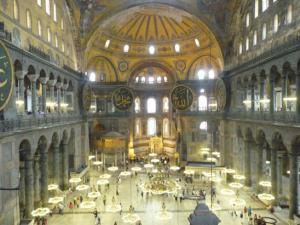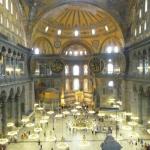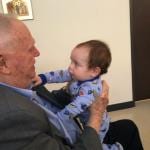Placing Christ over all, seeking Holy Wisdom, is true education.
When I advocate such an educational program, I am not speaking merely theoretically. I am speaking from experience. Twenty-one years ago, by God’s mercy, I founded the Torrey Honors Institute at Biola University. There I taught hundreds of students from the perspective of an epistemology of belief. Not every student has done well, part of a good education is encouraging the ability to choose, but the vast majority have, many been strengthened in their task of living intellectually fulfilling Christian lives. For three years I was the provost of Houston Baptist University helping found programs in cinema, media arts, apologetics, online education, while strengthening the honors college Finally, generous donors enabled the formation of a “the next step” college program, the culmination of all this previous work, that is a liberal arts education integrated fully with a K-12 school: The Saint Constantine School and College program.
The Constantine strategy is one of dialectical education, one-on-one tutorials, founded in global Orthodoxy. No student will ever have to borrow money to go to college.
Three basic ideas continue to form the philosophy of education behind the Constantine strategy.
First, we believe that a general education in the humanities must be as rigorous and as important as theological and career education. Specialization, for all its virtues, has robbed many scientists of the ability to think well about anything outside their discipline and sometimes even to think correctly about any limits to science. We try to educate our students to recognize the place of beauty in the life of a Christian.
Second, we believe a university education must unite all areas of truth into a holistic vision of reality. We have a great advantage here over our secular peers. Only Christianity has shown the capacity to unite the humanities and the sciences into a university. Christians recognize the limits of both ways of knowing.
Finally, this unified vision begins with teaching Christian students to ask the right questions. We try to find their real needs and not just minister to their felt needs. The heart of a liberal education is in discussion between a tutor and his students. Jesus modeled what is often called Socratic discussion on the road to Emmaus. There the Lord asked them a series of questions and journey with them as a teacher. Only when they had been able to learn and question for themselves were they allowed to see His risen glory in the breaking of the bread.
This pattern of education can transform lives.
Most important, the course pursued here is intellectual honest in that it recognizes the problems facing a faithful Christian. It centers on our personal and corporate relationship with Jesus Christ in the historic Orthodox Church. It is humble in its openness to error, even serious error. It is at peace with the Gospel I first heard as a little boy, but also at peace with the philosophy I was taught as a man.
I came to Christ following a sermon by my father on the Blessed Hope. My father’s words stirred my heart and I cried out to the Lord Jesus. He heard my cry and delivered me from sin and guilt. I cannot explain that feeling or reality to anyone who has not experienced it. It is real nonetheless. It is more real than anything else I have experienced. The older I get the harder it is to doubt it, though of course I still do at times. Our age has many blessings and one of them is prevent any Christian from growing too intellectually complacent!
Still the importance of the Bible and the marvelous truths, it contains becomes more and not less clear to me with time. The problems of Biblical history have not vanished, but they have been transformed in my thinking into long-term research programs. We do not, after all, live our lives intellectually merely to persuade the skeptic, but to follow the demand of Socrates to “know ourselves.” I would be false to what I think I know, if I did less follow the Logos, the divine dialectic, with my entire being.
When I claim that Jesus is my Lord, I also mean that my beliefs about Him and His Word take epistemological priority over every other belief I have. It has never, perhaps, been easy to make that claim within the smart set of any culture. This is not discouraging, but promising. What the prophet Daniel saw so plainly is coming to pass as knowledge of one sort advances, while folly and vice also grow. This always has led to an “end of time” where all things are made new as the constant project for justice, in myself, in us, in society unfolds in God’s good time.
My epistemology does not cause me to deny my doubts. It does allow me to rejoice in them while enjoying the benefits of my beliefs. Could I change my mind? Of course, I have done so before. So far it has been a joyous and fruitful intellectual life, which I can commend to you. If it is midnight for our particular culture, which cannot even defend marriage as an institution, I do not despair. My ultimate hope is in the new and greater heavenly city, which my grandmother saw in a vision just before her conversion. If this nation fails, then the world is wide and other Christians will step to take our place.
This is not incompatible with faithful intellectual activity in this age; indeed for me it has informed and motivated it. My midnight cry for us in these last days is: “Lord I believe, help thou my unbelief!”
———————-
Based on a presentation at Loma Linda University and at the College at Saint Constantine.













